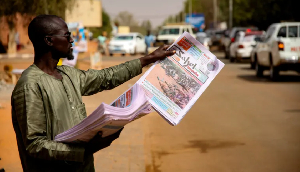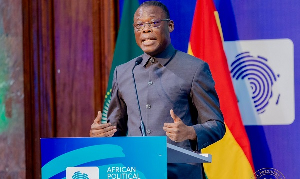Government may have improved the conditions of cocoa farmers by paying a 72.19 per cent of net Freight On Board (FOB) price as producer price to farmers, documents available to The Chronicle reveal how on the contrary, farmers were literally bilked in the payment of cocoa bonuses from profits made in the 2006/2007 cocoa season. The documents reveal that out of a total of over GH¢93.6million (over ¢936billion old cedis) that was realized as a result of excess gained over the projected world price, only GH¢ 16.02million was paid to farmers as bonuses representing just a little over 17 per cent of the total excess profit made.
For the 2006/07 season, the Technical Committee of the Producer Price Review Committee (PPRC) projected an average FOB price of $1,500 per tonne. The actual price realized, was $1,668 representing a difference of $168 over the projected figure. It was also projected that 600,000 tonnes of cocoa will be produced for the 2006/07 season but at the end of the season, a total of 614,469 tons were realized. The projected average exchange rate for the cedi to the US dollar was one cedi to $0.9100 but the actual exchange rate at the end of the season was a cedi to $0.9068. This situation then implied that the total of unanticipated profit made which is obtained by multiplying the difference of $168 by the total production of 614,469 tonnes, was $103,320,972.
Using the Committee’s own projected exchange rate of a cedi to $0.9068, the figure translates into GH¢ 93,609,682 (or in old cedi terms, ¢936,096,821,856). Out of this amount that was realized as unanticipated profit and from which government paid bonuses to farmers, only GH¢16.02million out of the GH¢93.6million or ¢160billion out of the over 936billion was paid as bonus to farmers. This situation also means that though government paid 70.19 per cent of net FOB price to farmers in terms of the unanticipated profit, it paid just a little over 17 per cent to the farmers.
The figures are confirmed in the 2008 budget statement in which it is stated in paragraph 345 that, “government will not relent on its promise of ensuring that the living conditions of the ordinary Ghanaian farmer are improved. Government has decided to pay GH¢27.54 per tonne as bonus to cocoa farmers for cocoa purchases for the 2006/07 main crop season. A total amount of GH¢16.02 million will thus be paid as bonuses to cocoa farmers. Commenting on the issue, the National Democratic Congress Member of Parliament for Asutifi South, Alhaji Collins Dauda, said what government had done amounts to secret deprivation of what should legitimately go to cocoa farmers.
He was of the opinion that since government had decided to pay farmers a certain percentage of net FOB price, it would have just been right to give farmers the same percentage anytime there is additional profit made over what is anticipated or projected. Alhaji Dauda intimated that if government was to be fair to farmers as it wants the populace to believe, it should have paid farmers something better than what was paid. “You see, because we don’t get to know how much is realized every year, the government pays any amount to farmers and blows its horns for doing so much for farmers,” the legislator said.
Mr. Kweku Kwarteng, government spokesperson on finance, said the government had always been fair to cocoa farmers since assuming power seven years ago. Explaining why government paid that amount as bonuses, he pointed out that sometimes-projected prices are not met and under such circumstance, government always has had to fall on other sectors to raise money to meet the cost of paying farmers prices that are based on the unmet projected prices. “If world price comes below what is projected, you cannot say you are reducing producer price,” he said. Mr. Kwarten explained that government has to sometimes cushion the other sectors that come to the aid of the cocoa industry in times of crises, when such unanticipated profits are realized.
It is however known that it was only in the 2004/2005 cocoa season that the government did not pay bonuses to cocoa farmers. The spokesperson further pointed out that some of the money also goes into a fund called the Cocoa Stabilization Fund (CSF) that is meant to ensure that when price of the commodity reduces drastically on the world market in a particular year, government would still be in a position to pay a respectable price to cocoa farmers.
He analyzed that the price of cocoa had been increasing on the world market because of the falling value of the US dollar which has culminated in more investors moving away from the US stock market to the commodities market. Mr. Kwarteng was of the opinion that if the trend changes and the US economy begins picking up, the price of cocoa may suffer a downward trend and hence the need to set up contingency plans to cater for reasonable producer price in case of any such reductions in the world market price of cocoa. “What was happening to cocoa farmers before this government took over was just criminal,” he accused the government of the NDC and intimated government’s resolve to help better the lot of cocoa farmers.
Meanwhile, The Chronicle is still studying documents on payments of bonuses vis a vis what were realized in unanticipated profits, how much has been going into the CSF over the years and its utilization and a comparative analysis of NDC and NPP policies for the all-important cocoa sector.
General News of Tuesday, 4 March 2008
Source: The Chronicle












